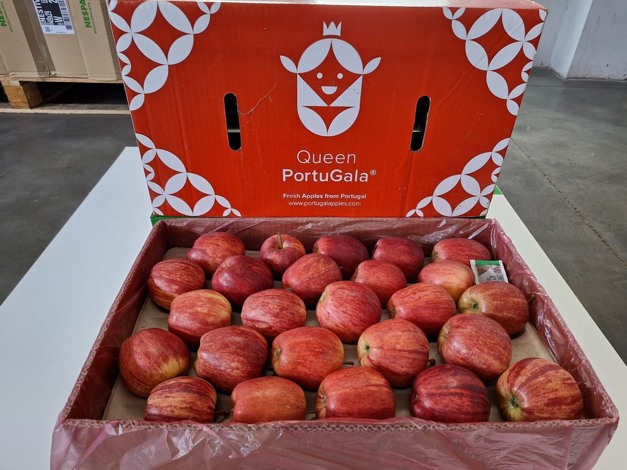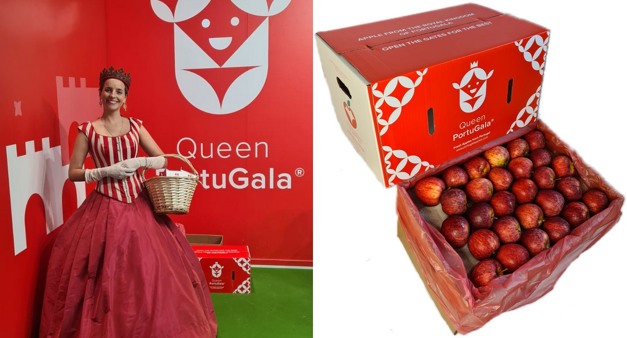Portuguese apple production might increase at the cost of the Rocha pear production, says Joao Juma, export manager for Portuguese apple exporter United Growers: “There has been a trend towards reduction when it comes to the acreage of Rocha pears. These are being replaced for apple trees, due to the effects of global warming, as apple trees require less hours of cold during winter. So we expect our apple production area to increase steadily with this in mind. It’s challenging to predict what will happen though, as we face increased costs of production, energy and manpower, which might dissuade investments in new orchards. It’s also important to mention the rise of apple imports from countries with lower production costs, which put pressure on the local prices and might contribute to the overall will to expand or reduce the Portuguese apple production.”
Several European countries had to deal with extremely hot weather this summer and Portugal wasn’t spared in this. However, this only had a noticeable impact on some of the apple varieties, Juma explains. “We faced a heatwave during blossoming, although the trees responded better than expected overall. We can say that in terms of volumes, we increased production by 5 per cent compared to last year. However, last year was considered a year of low volumes, so this increase is still far from our production capacity, as we’re currently at 70 per cent. As such, this is not seen as a positive yield. When we look at specific varieties, we had a small increase on Gala, but a very decent production of Golden. On Fujis and Granny Smith, unfortunately the hot weather had a negative impact, as they are later varieties which were exposed to the heatwave and eventually resulted in higher losses.”

Next to the heatwave, Juma emphasizes there were more issues with the weather overall. These challenges force growers to innovate and improve in the cultivation of their product. “This year was a-typical in terms of weather, as we had lower amounts of cold hours during winter, a shortage of water, heat waves and strong winds during blossoming and harvest. Fortunately, we didn´t get hit by hail, which has been an important factor the last few seasons. Portuguese growers have been investing in better ways to manage their water resources, irrigation techniques and hail cannons to overcome these possible weather challenges.”
At this point of the season, the big winner in terms of markets is Latin America. The prices there are so good, that United Growers is shifting their focus to it somewhat, Juma states: “Portugal traditionally exports to other European markets, the UK and Brazil. At the moment Brazil is in full swing and performing well in terms of pricing as per the lower yield of South American crops last season. For United Growers and as per our purpose as a company of developing new markets and adding value to the Portuguese apple, we’re facing some changes. Our major markets as a company have been the Middle East, Asia and India, but this year as the prices for the Latin American market are over 30 per cent higher than the mentioned markets, we have been reluctant to export significant volumes. We have been supplying some of our Middle East partners to maintain the brand present and the long term strategy, but in terms of revenue Latin America has been the main drive this year. We are developing new markets such as Uruguay, Costa Rica or Colombia and exploring other possibilities in smaller markets within the region.”

Despite the lower production of apples in Poland, United Growers feels there are other apple producing countries that are stepping up their production, Juma explains. “Although Poland had a decrease of production, we’re not feeling that there is lower production in other countries such as Spain, France, Italy. Moreover, other players have started developing their distribution in Europe such as Moldova, Serbia, Ukraine which overall pressures market prices everywhere. Our strategy has to be focused on markets where our quality is recognized and where we established relationships throughout the years in order to maintain target prices that are workable for all stakeholders.”
“As competition increases within the apple segment we feel that more than ever customers look for quality, flavour and colouration. Fortunately we are blessed with this as our climate allows great colouration, brix contents and we invested in varieties that are striped and in higher demand. The way forward will be to avoid the price wars and focus on delivering a differentiated product with recognized value,” Juma concludes.
For more information:
Joao Juma
United Growers
Tel: +351 210 935 261
Email: [email protected]
www.portugalapples.com










